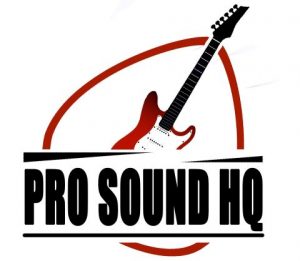The three most popular electric guitars of all time are the Stratocaster, the Telecaster and the Les Paul. In this article, I’ll compare the Strat vs the Tele vs the LP in terms of the features and design, the natural tone and the look and feel. I’ll also look at the specifications of each model on the Gibson and Fender line-ups so you can look at the best options for your budget.
The Quick Answer
Telecaster and Stratocaster guitars both have single coil pickups, whereas the Les Paul has humbucker pickups. This make the Les Paul more suitable for high gain amp settings, and makes the Tele and Strat sound brighter. The Telecaster is often considered the most versatile sounding guitar.
Comparing Features
If you’re just interested in the specifications of each guitar, then check out the table below to compare all the key features between the standard versions of the Fender Stratocaster, Fender Telecaster, and Gibson Les Paul.
Remember that you can scroll sideways if you’re on mobile to see the Telecaster specifications in the table!
| Feature | Les Paul | Stratocaster | Telecaster |
| Body Shape | Single Cutaway | Double Cutaway | Single Cutway |
| Body Wood | Mahogany | Ash or Alder | Ash or Alder |
| Pickups | Two Humbuckers | Three Single-Coils | Two Single-Coils |
| Neck Shape | Rounded C-Shape | C-Shape | Deep-C/ U-Shape |
| Neck Wood | Mahogany | Maple | Maple |
| Neck Construction | Set Neck | Bolt-On | Bolt-On |
| Frets | 22 | 22 | 22 |
| Fretboard Wood | Rosewood | Rosewood or Maple | Rosewood or Maple |
| Scale Length | 24.75” | 25.5” | 25.5” |
| Bridge | Fixed | Tremolo | Fixed |
| Number of Volume Knobs | 2 | 2 | 1 |
| Weight | 9-12 pounds (4.1-5.4 kg) | 8 pounds (3.6 kg) | 8 pounds (3.6 kg) |
Here are links to each guitar so you can compare the current prices:
- Gibson Les Paul ’60s Standard (Guitar Center)
- Fender American Professional II Stratocaster (Amazon)
- Fender American Professional II Telecaster (Ama\on)
Keep in mind that these are just the specifications for the Gibson and Fender standard versions, the features will vary depending on which specific model you choose, and if it’s a Fender/ Squier or Gibson/ Epiphone version.
Sound Differences
Probably the most important thing to consider when choosing between these three iconic guitars, is the tonal differences. Each guitar has a unique tone due to several factors including the pickup, tone woods, scale length and even the neck construction.
Les Paul guitars have a darker and mellower tone than Stratocasters and Telecasters, whilst the Strat is the brightest sounding of the three. Stratocasters are best suited to clean tones, whilst the Les Paul is most suited high gain. The Tele is often considered the most versatile sounding.
Les Paul vs the Strat and Tele
- The Les Paul is the most different sounding of the three guitars. It has a much more mellow and dark tone than the Stratocaster and Telecaster. It has a thicker tone that is less susceptible to “humming” from the pickups, making it often more suitable for heavier styles of music such as metal. The single coil pickups on the Tele and Strat often produce more feedback at high gain.
- Les Paul guitars often have better sustain than Telecasters and Stratocasters due to the higher output humbucker pickups and the weightier design.
Strat vs Tele
- The Stratocaster has a brighter sounding neck pickup compared the the Telecaster.
- The Telecaster sounds fuller than the Stratocaster.
- The Telecaster has a thicker sounding bridge pickup, making it more suitable for high gain amp settings. This is because the bridge pickup is located in the metal part of the bridge and not on the body.
The Stratocaster is most suited to clean music styles such as blues and jazz, whilst Les Paul’s are best suited to heavier styles such as metal. The Telecaster plays most styles well but can struggle with heavy metal more due to the single coil pickups. All three guitars suit the rock genre well.
Here is a video to demonstrate the differences in tone using various different amp settings. It’s set to start at the correct time in the video so you can just hit play without searching for the right bit!
Look and Feel
The look and feel of the guitar is also really important to consider when choosing which to buy, as it massively contributes to how much you enjoy playing (and how much you’ll end up practicing)!
Here are some key points:
- The Les Paul is the heaviest guitar (weighing between 9-12 pounds/ 4.1-5.4 kg), whereas the Stratocaster and Telecaster are lighter (both 8 pounds/ 3.6 kg). This means some players may find the Les Paul more difficult to stand with for a long time.
- The Stratocaster has a contoured body which can be more comfortable to sit and stand with compared to the flat body designs found on the Les Paul and Tele.
- The Stratocaster often has the shallowest neck, followed by the Les Paul and finally the Tele which often has a thicker neck. This means that some players with smaller hands may find the Tele and Les Paul more uncomfortable to hold. However, there are several different models available so you will easily be able to find the right neck with any of these guitars.
- Les Paul’s and Tele’s both have a single cutaway body, compared to the Stratocaster which has a double-cutaway design, making upper fret access a bit easier on the Strat.
- The Les Paul does not always have a pickup guard whereas most Telecaster and the Stratocaster guitars do traditionally.
- The Les Paul has the shortest scale length (24.75″) compared to the Tele and Strat (25.5″) but this often is not enough to affect playability.
- Les Paul’s usually have more unique maple cap tops which can look pretty unique, whereas the Strat and Tele generally have plainer designs and use a contrasting pickup colour to add some character to the finish.
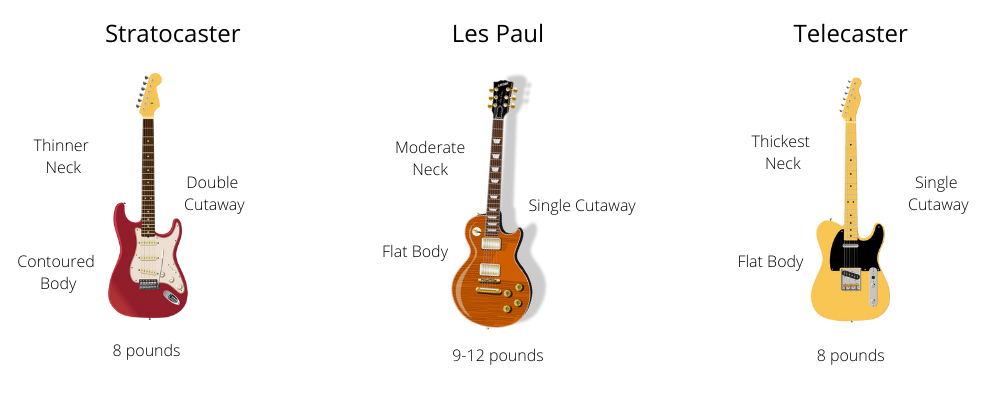
I’ve written a complete buyer’s guide for electric guitars which takes you through all the things you need to consider and a step-by-step method to narrowing down your selection and choosing the best option. Here is a link to the article.
Models Available
These three iconic guitars were originally produced by Fender and Gibson, two American brands. However, both brands now have a sister company which offers more affordable versions of the Strat, Tele and Les Paul. Epiphone is responsible for producing the more affordable Les Paul models, whilst Squier produces Tele’s and Strat’s.
I have collated pretty much every standard currently available (non-limited edition/ special/ modified/ signature) Telecaster, Stratocaster and Les Paul model by both Fender/ Gibson and Squier/ Epiphone into the tables below.
It includes the features and price (based don Guitar Center at the time of writing) of each model and it’s split into price brackets. Each table is organised by price (low to high), so you can easily see the options available based on your budget.
Guitar Center are always the first place I look at when I’m interested in a new electric guitar because have a huge range of models for sale and always have some excellent deals on. Here’s a link to take you directly to Guitar Center’s electric guitar range so you can see all the offers available at the moment.
Contents:
- Entry-Level (under $250)
- Low-Mid Range ($250-$500)
- Mid-Range ($500-$1000)
- Mid-High End ($1000-$2000)
- High-End (over $2000)
Entry Level (Under $250)
| Guitar | Origin | Body Wood | Neck Style | Price |
| Epiphone Les Paul Special I | China | Mahogany | Bolt-On | $150 |
| Squier Bullet Strat | Indonesia | Basswood | Bolt-On | $180 |
| Squier Bullet Tele | Indonesia | Basswood | Bolt-On | $180 |
| Epiphone Les Paul Special E1 | China | Poplar | Bolt-On | $180 |
| Epiphone Les Paul Special II | China | Mahogany | Bolt-On | $230 |
| Squier Affinity Strat | China | Alder | Bolt-On | $230 |
| Squier Affinity Tele | China | Alder | Bolt-On | $230 |
| Epiphone Les Paul Studio E1 | China | Mahogany | Bolt-On | $250 |
Low-Mid Range ($250-$500)
| Guitar | Origin | Body Wood | Neck Style | Price |
| Epiphone Les Paul Junior | China | Mahogany | Set-Neck | $380 |
| Squier Contemporary Strat | China | Poplar | Bolt-On | $400 |
| Squier Contemporary Tele | China | Poplar | Bolt-On | $400 |
| Epiphone Les Paul Special | China | Mahogany | Set-Neck | $400 |
| Squier Classic Vibe Strat | Indonesia | Poplar/ Pine | Bolt-On | $430 |
| Squier Classic Vibe Tele | Indonesia | Poplar/ Pine | Bolt-On | $430 |
| Epiphone Les Paul Studio | China | Mahogany | Set-Neck | $450 |
Mid-Range ($500-$1000)
| Guitar | Origin | Body Wood | Neck Style | Price |
| Epiphone Les Paul Classic | China | Mahogany | Set-Neck | $500 |
| Fender Standard Strat | Mexico | Alder | Bolt-On | $500 |
| Epiphone Les Paul Standard | China | Mahogany | Set-Neck | $600 |
| Epiphone Les Paul Modern | China | Mahogany | Set-Neck | $650 |
| Epiphone Les Paul Custom | China | Mahogany | Set-Neck | $680 |
| Fender Player Strat | Mexico | Alder | Bolt-On | $750 |
| Fender Player Tele | Mexico | Alder | Bolt-On | $750 |
| Epiphone Slash Les Paul | China | Mahogany | Set-Neck | $900 |
| Fender Deluxe Strat | Mexico | Alder | Bolt-On | $950 |
| Fender Deluxe Tele | Mexico | Alder | Bolt-On | $950 |
| Fender Vintera Strat | Mexico | Alder | Bolt-On | $950 |
| Fender Vintera Tele | Mexico | Alder | Bolt-On | $950 |
Mid-High End ($1000-$2000)
| Guitar | Origin | Body Wood | Neck Style | Price |
| Gibson Les Paul Special Tribute | America | Mahogany | Set-Neck | $1000 |
| Fender Road Worn Tele | Mexico | Alder | Bolt-On | $1150 |
| Gibson Les Paul Tribute | America | Mahogany | Set-Neck | $1000 |
| Fender Boxer Strat | Japan | Basswood | Bolt-On | $1200 |
| Fender Boxer Tele | Japan | Basswood | Bolt-On | $1200 |
| Fender American Performer Strat | America | Alder | Bolt-On | $1200 |
| Fender American Performer Tele | America | Alder | Bolt-On | $1200 |
| Gibson Les Paul Studio | America | Mahogany | Set-Neck | $1500 |
| Gibson Les Paul Junior | America | Mahogany | Set-Neck | $1500 |
| Gibson Les Paul Special | America | Mahogany | Set-Neck | $1600 |
| Fender American Professional Strat | America | Alder | Bolt-On | $1500 |
| Fender American Professional Tele | America | Alder | Bolt-On | $1500 |
| Fender American Showcase Strat | America | Alder | Bolt-On | $1700 |
| Fender American Showcase Tele | America | Alder | Bolt-On | $1700 |
| Fender American Ultra Strat | America | Alder | Bolt-On | $1900 |
| Fender American Ultra Tele | America | Alder | Bolt-On | $1900 |
High-End (Over $2000)
| Guitar | Origin | Body Wood | Neck Style | Price |
| Gibson Les Paul Classic | America | Mahogany | Set-Neck | $2000 |
| Fender American Original Strat | America | Alder | Bolt-On | $2000 |
| Fender American Original Tele | America | Alder | Bolt-On | $2000 |
| Fender American Ultra Strat | America | Ash | Bolt-On | $2300 |
| Fender American Ultra Tele | America | Ash | Bolt-On | $2300 |
| Gibson Les Paul Standard | America | Mahogany | Set-Neck | $2500 |
| Gibson Les Paul Modern | America | Mahogany | Set-Neck | $2800 |
| Gibson Les Paul Slash | America | Mahogany | Set-Neck | $3000 |
Design Differences
Now let’s take a look at the design differences between each guitar and how this effects the tone, feel and look of the Strat, Tele and LP.
Body
The Les Paul has a solid mahogany body, whereas, Telecaster and Stratocaster models usually have an alder body. The Les Paul and Tele have a flatter, single cutaway design, whereas the Strat has a more contoured, double cutaway design to make it very comfortable and improve upper fret access.
Neck
The neck shapes of Les Paul’s, Tele’s and Strat’s differs depending on the model in question. Models based on older variants of the classic guitars, tend to have a thicker and rounder neck. Traditionally, the Strat has the thinnest and flattest neck, followed by the Les Paul and finally the Telecaster has the roundest. However, there are examples of all three with thick and thin necks.
Les Paul guitars usually have a mahogany neck and a rosewood fretboard, whereas Telecaster and Stratocaster models typically have a maple neck with a maple fretboard, however some will have a rosewood fretboard instead. All three guitars have 22 frets.
The neck construction is also different between models. All Les Paul’s produced by Gibson, and the higher end models produced by Epiphone, have a set-neck design, whilst the cheapest models have a bolt-on construction. However, pretty much every Strat and Tele has a bolt-on neck construction.
The neck construction affects the tone and sustain of the guitar, find out more about this top in my article comparing set-necks and bolt-on constructions.
The scale length of the Strat and Tele is 25.5″ whilst the scale length of the Les Paul is 24.75″. This has an impact on the tone and feel of the guitars. Check out my article comparing 24.75″ and 25.5″ scale guitars to learn more.
Pickups
Perhaps the most significant difference between the Les Paul and the Strat and Tele, is the pickups.
Les Paul’s have two humbucker pickups which have a dark, and mellow sound and do not suffer from feedback. Stratocaster and Telecaster guitars have single coil pickups which sound brighter but are susceptible to feedback.
Check out my article comparing pickup types to learn more.
The Stratocaster has three pickups, whilst the Telecaster just has two. This can give the Stratocaster a bit more flexibility, however it is usually the Tele which is considered to have a more versatile tone. This is due to the bridge pickup placement.
Strat’s have the bridge pickup located on the body, whereas the Tele has it located on the metal bridge itself, causing the tone to be thicker making it suitable for higher gain than the Strat which can sound quite thin.
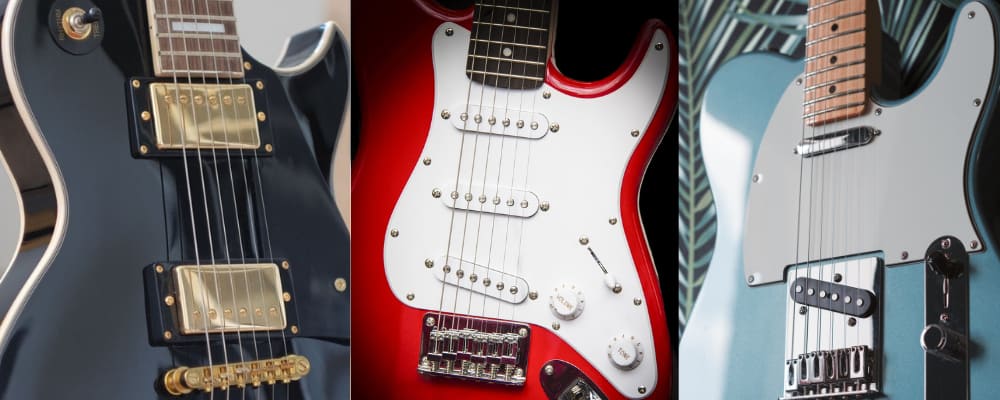
Controls
Due to the number of pickups on each guitar, the controls also vary.
- Stratocasters have three pickups, a 5-way pickup selector, two tone controls, and a volume control.
- Telecasters have two pickups, a 3-way pickup selector, one tone control and one volume control.
- Les Paul guitars have two pickups, a 3-way pickup selector, two tone controls, and one volume control.
Each guitar works slightly differently to allow you to achieve different tones by adjusting the pickup selector and the tone controls. I’ve written some in-depth guides explaining how to use the controls on each guitar:
- How to Use a Stratocaster’s Controls
- Les Paul’s Controls Explained
- Guide to Using a Telecaster’s Control
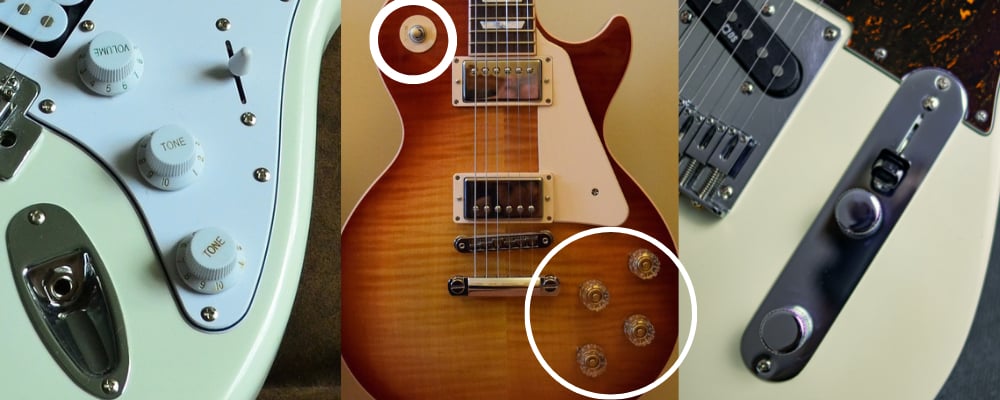
Bridge
Finally, the bridge in the Stratocaster is different to the bridges found in the Les Paul and Telecaster.
Stratocasters have synchronised tremolo bridges which have a tremolo arm which can be used to change the pitch of the strings by pushing and pulling to add a unique effect. Les Paul’s and Telecaster’s have fixed bridge which does not feature a tremolo arm, and only functions to hold the strings in-place.
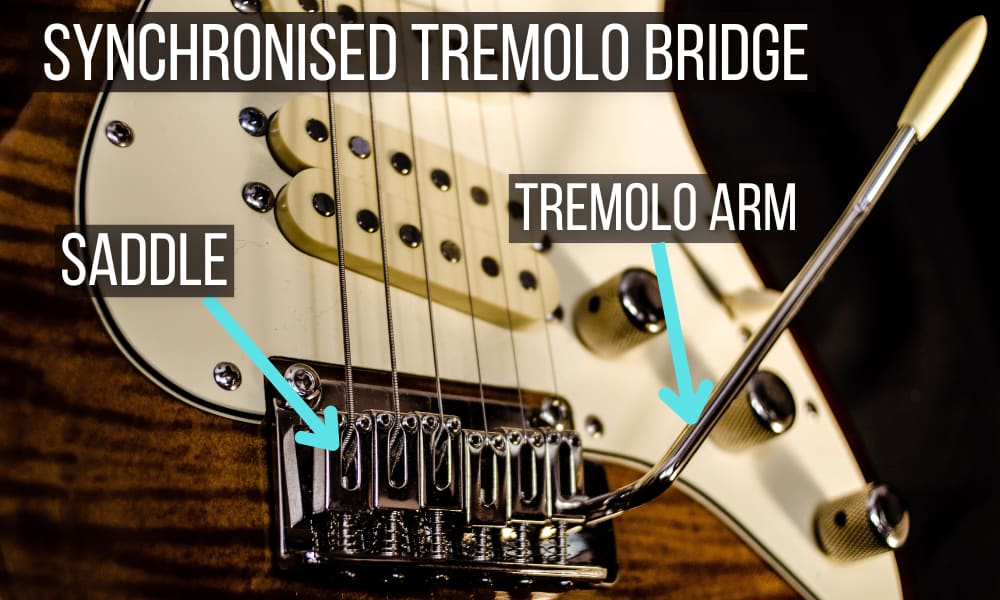
Which Should You Choose?
The best way to decide if you want a Telecaster, Stratocaster or Les Paul, is to try them out in the store. This gives you the best feel for the instrument and you can hear exactly how it sounds. This works even if you’re a total beginner, just sit and stand with the instrument and then ask if the store assistant will play some different tones on each guitar to demonstrate it.
With that said, in my opinion, each model excels in different areas so here are a few things to keep in mind.
- If you want to play heavy metal or hard rock then choose a Les Paul.
- If you’re looking for the most versatile guitar then choose a Telecaster.
- If you want to play mainly clean tones then choose a Stratocaster.
These are very generalised points though, and you can still play different styles on all three instruments, it just depends what tone you’re looking for.
Which is the best for a beginner?
For beginners, a Stratocaster is a popular option because it is a very comfortable guitar to play with. For new guitarists looking to play metal and hard rock, a Les Paul is a better option as it sounds better with distortion. Telecasters usually offer the most versatility for those who want to play a variety of styles.
With that said, it’s all personal preference, so go ahead and listen to each guitar and figure out which you really like the sound of, and which you like the look of as well!
I’ve written a complete buyer’s guide for electric guitars which takes you through all the things you need to consider and a step-by-step method to narrowing down your selection and choosing the best option. Here is a link to the article.
Here are some more articles you might enjoy:
